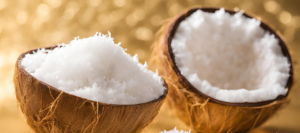Introduction

Imagine sipping on a fresh coconut water while lounging on a beach. What if I told you that this delicious experience could also pave the way for more sustainable agriculture globally? Organic coconuts, often overlooked in the broader conversation around sustainable practices, are uniquely positioned to revolutionize farming. This article delves into the many reasons why organic coconuts are not just a trend but a significant player in the future of sustainable agriculture.
The Essence of Organic Farming
Organic farming is all about growing crops without the use of synthetic pesticides, fertilizers, genetically modified organisms (GMOs), other chemicals. The philosophy behind organic farming encompasses soil health, biodiversity, and water conservation—principles that align perfectly with sustainable practices.
What Makes Coconuts Special?
Why coconuts? First off, coconut palm trees are highly resilient and thrive in a range of conditions. This adaptability makes them a reliable crop for farmers in various regions. Moreover, every part of the coconut tree—from its fruit to its leaves—can be used, reducing waste and providing numerous by-products. Think coconut oil, coconut water, coconut milk, and even coconut-based building materials!
“One coconut tree has the potential to yield up to 200 coconuts annually, with each fruit capable of producing water, milk, oil, and even nutritious flour from its meat.”
Environmental Benefits
Soil Preservation and Biodiversity
Organic coconut farming significantly contributes to soil health. The absence of synthetic chemicals means that the soil is less likely to suffer from degradation and erosion. Organic practices often include crop rotation and intercropping, which help maintain soil fertility and support biodiversity.
- Crop Rotation: Alternating the planting of coconuts with other crops prevents the depletion of specific soil nutrients.
- Intercropping: Combining coconut farming with other plants like legumes can improve soil health and increase biodiversity.
Water Conservation
Coconut palm trees are relatively drought-resistant, requiring less water compared to other crops like rice and sugarcane. Organic farming practices often incorporate techniques to conserve water further, such as mulching and drip irrigation.
Economic Advantages
Higher Market Value
Organic products generally fetch a higher market price than their non-organic counterparts. For coconut farmers, this means better profit margins and a more stable income. The increasing consumer demand for organic products ensures a consistent market for organic coconuts.
Job Creation
Organic farming is more labor-intensive due to the need for careful soil management and weed control. This labor-intensive nature creates more jobs within agricultural communities, offering socio-economic benefits that conventional farming does not.
“The shift to organic coconut farming has the potential to not only sustain but also uplift entire agricultural communities by providing better income and more job opportunities.”
Health Benefits
Nutrient-Rich and Chemical-Free
Organic coconuts are free from harmful pesticides and chemicals, making them a safer option for consumers. They also tend to be richer in nutrients, offering more health benefits.
- Coconut Water: Natural electrolytes and hydration
- Coconut Oil: Antimicrobial properties and healthy fats
- Coconut Meat: High in fiber and essential minerals
Potential to Fight Malnutrition
In regions where malnutrition is prevalent, organic coconuts provide a nutrient-dense food source. The various coconut by-products can serve as essential dietary supplements, offering crucial vitamins and minerals.
Global Impact
Reduced Carbon Footprint
Organic farming techniques generally involve fewer energy inputs and lower carbon emissions. The global adoption of organic coconut farming could significantly mitigate climate change impacts.
Empowering Developing Nations
Many developing nations are key producers of coconuts. By transitioning to organic farming, these countries can improve their agriculture sectors, bolster their economies, and contribute positively to global sustainability efforts.
Conclusion
From preserving soil health to providing economic benefits and enhancing global sustainability, organic coconuts embody the future of sustainable agriculture. Whether it’s through better farming practices, higher market value, or health benefits, the impact of organic coconuts extends far beyond the tropical regions where they are grown. The next time you sip on coconut water, remember that you’re partaking in a small but significant step towards a more sustainable world.
“Embracing organic coconuts is not just a choice for health or taste; it’s a choice for the planet.”
Call to Action
If you’re inspired by the potential of organic coconuts, consider supporting organic coconut products in your local stores. Your choices can make a significant impact on global sustainability and the livelihoods of farmers worldwide.
For more information on the benefits of organic farming, you can check out The Organic Center.
Let’s make sustainable choices, one coconut at a time. 🌴



